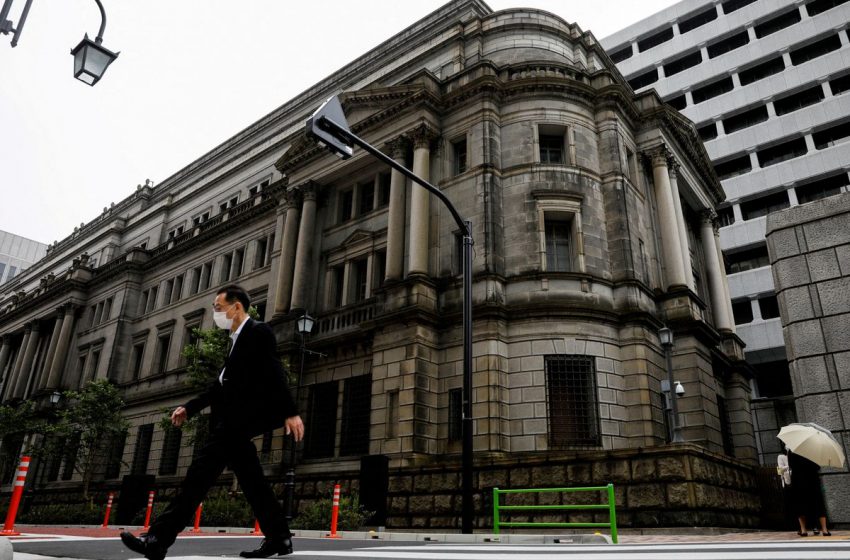
A man wearing a protective mask walks past the headquarters of Bank of Japan amid the coronavirus disease (COVID-19) outbreak in Tokyo, Japan, May 22, 2020.REUTERS/Kim Kyung-Hoon
BOJ stands its ground on benchmark yield as global rates pressure builds
Japan’s central bank stepped up efforts on Wednesday to keep a key bond yield below a red line, offering to buy more government debt, including through ad-hoc purchases, to hold down interest rates against a pull higher by global yields.
The intervention comes as the Bank of Japan (BOJ) seeks to keep monetary policy ultra-loose, even at the cost of fuelling further falls in the yen currency, which could push up import costs and hurt the economy.
The central bank increased purchases of Japanese government bonds (JGB) with maturities of three to 10 years, and offered to buy super-long bonds in unscheduled, emergency operations.
Combined, the BOJ offered to buy more than 2 trillion yen ($16.40 billion) worth of JGBs on Wednesday, in addition to separate offers for unlimited purchases of 10-year JGBs at a fixed rate of 0.25%.
“The BOJ is trying to strengthen its message to the market, that it’s strongly committed to keeping financial conditions in Japan very accommodative and won’t accept those kinds of higher long-term bond yields,” said Masayuki Kichikawa, chief macro strategist at Sumitomo Mitsui Asset Management.
“We need to remember the official BOJ target is 0% for the 10-year JGB, not 25 basis points.”
The move bolsters the BOJ’s intervention in the bond market unveiled on Monday, when it pledged to buy unlimited amounts of 10-year bonds at 0.25% until Thursday. read more
The yield on the benchmark 10-year JGBs retreated on Wednesday from a more than six-year peak hit earlier in the week, falling 3.0 basis points to 0.215%.
The BOJ’s emergency offer to buy super-long bonds also drove down yields on longer-dated maturities. The 20-year JGB yield lost 8.5 basis points to 0.73% and the 30-year JGB yield was down 10 basis points at 0.970%.
“We decided to take the step because the entire yield curve was under strong upward pressure, heightening the risk of the 10-year yield exceeding our upper limit,” a BOJ official told Reuters about Wednesday’s move.
WEAK YEN DILEMMA
The super dovish BOJ is struggling against the tide of rising global interest rates as central banks elsewhere race to beat accelerating inflation, with the international spike in yields dragging Japan’s yields higher.
Complicating that challenge for Tokyo policymakers are the rising costs of imports brought by a weakening currency and global fallout of the Ukraine war.
BOJ Governor Haruhiko Kuroda appeared unfazed over the yen’s fall, saying the move was driven partly by Japanese firms’ dollar buying to pay energy bills.
“I don’t think the BOJ’s market operation is having a direct effect on currency moves,” Kuroda told reporters after meeting Prime Minister Fumio Kishida. “We didn’t discuss anything in particular on currency moves.”
Despite increasing official jawboning over the yen’s fall, Japanese authorities are unlikely to opt for direct yen-buying intervention or raise the BOJ’s yield targets to strengthen the currency, said former top currency diplomat Naoyuki Shinohara.
“The BOJ’s position appears to be that a weak yen is good for the economy,” Shinohara told Reuters. “It probably doesn’t see the yen’s current levels as dangerous.”
Markets will watch for the release of the BOJ’s bond-buying schedule for the April-June quarter, set for 5 p.m. on Thursday (0800GMT), to seek any signs of additional purchases.
“The BOJ will increase the number of auction dates and the amount of outright JGB purchases as needed, taking account of market conditions,” the bank said in announcing Wednesday’s plan to ramp up bond buying.
Under yield curve control, the BOJ sets its short-term rate target at -0.1% and that for the 10-year JGB yield around 0%.
Its current guidance is to allow the 10-year yield to move flexibly, as long as it is below an implicit 0.25% ceiling set around the target.
($1=121.9300 yen)
Reporting by Leika Kihara and Kevin Buckland; Additional reporting by Tetsushi Kajimoto, Takahiko Wada, Kantaro Komiya, Daniel Leussink and Daiki Iga; Editing by Sam Holmes and Bradley Perrett
This article was originally published by Reuters.















